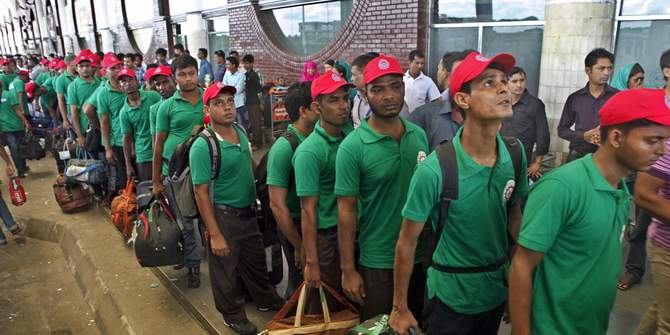
By Syed Mansur Hashim
The Daily Star / 27 December 2016
Back in April 2015, the World Bank (WB) released a Migration and Development Brief where it was found that Bangladeshi migrants pay the highest recruitment costs worldwide. According to WB data, worker-paid-recruitment costs averaged USD 1,955 in Kuwait with Bangladeshis paying anywhere between USD 1,675 and USD 5,154. “Recruitment costs by migrant workers to recruitment agents, on top of the fees paid by the employers, are a major drain on poor migrants’ incomes and remittance.” Indeed, over and above the direct fees that were paid to recruiters, migrant workers are often “subject to usurious interest rates of 50 percent on loans to cover the costs of migration….Recruitment agents are also often reported to offer bribes to the employing company personnel, with amounts ranging between USD 300 and USD 1,000 per worker and these costs are recovered from the workers.”
So, we have multifarious actors in this unholy mix to rip off Bangladeshi overseas workers. It is not just unscrupulous recruiting agencies, but officials of some foreign companies who must be “compensated” to take our workers. To add salt to injury, Bangladeshi expatriate workers earn much less than migrant workers from other countries. According to a report published in this paper on December 9, the average cost of migration to Saudi Arabia vis-à-vis average monthly wage, we find that in 1985, it cost Tk. 20,000 to go to that country and average monthly income was Tk. 8,000. Fast-forward to 2016; it now costs a migrant worker Tk. 600,000 to enter the Saudi labour market but average monthly wage is a measly Tk. 15,000. So over the course of two decades, cost of economic migration to the Kingdom of Saudi Arabia has gone up 30 times while the income level has not even doubled!
A study by Malaysian NGO Tenaganita in 2007 found that the average Bangladeshi migrant worker spent anywhere between Tk. 160,000 – Tk. 220,000. Here too we have the same scenario where less than half the amount goes into recruiters’ coffers whilst the rest is used in Malaysia to pay bribes. According to migration experts all these costs including airfare should be the employers’ headache and not the migrant worker’s. However, as things stand now, it is the headache of poor workers who often sell their worldly possessions to seek our fortunes in foreign lands, only to wake up to the sad reality that not only have they been fleeced at home, but often get fleeced when they get over there.
This is the other half of the grim tale of the life of the average Bangladeshi migrant worker. We have been bombarded over the years of the trials and tribulations of our fellow countrymen, who find out (the hard way) that they are to be paid a fraction of what was agreed upon. Often, they have no rights as their passports are confiscated by employers and their existence reduced to a life of near-servitude. But then why do they stay on? Why do millions of new aspiring economic migrant workers brave these seemingly insurmountable odds to go to lands from whence thousands have returned with tales of horror? The sad reality is that eking out a mere living push people to take risks that defy common sense, and the lure of a “better life” for those living on the borderlines will always prove to be a pull too great to resist.
The government has been trying to work out State-to-State deals with a number of major markets including Malaysia. This is a laudable effort, but it is also a work in progress. The private recruitment empire is not about to let this multi-billion dollar industry slip out of its fingers without a fight. Nor is the government ready to offset the services offered by private recruiters as it will take time to develop the expertise to handle the economic migration process that involves millions of people every year. Having said that, there are a number of steps authorities can take to lessen the illegal activities of crooked agencies. As we take stock of the Malaysia-Bangladesh G-2-G deal, a landmark agreement despite hiccups, newspaper reports inform us that many Malaysian companies have resorted to hiring undocumented workers. The case for this is purely financial. Under the agreement, major cost heads including airfare have to be borne by the employers and benefits (including salary) will have to be paid as per terms of agreement.